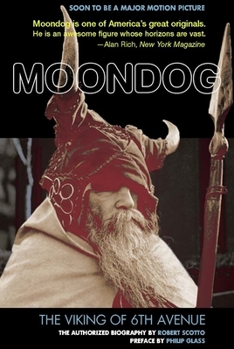Moondog: The Viking of 6th Avenue: The Authorized Biography
Select Format
Select Condition 
Book Overview
The basis of a full-length documentary.
"Moondog is one of America's great originals."--Alan Rich, New York Magazine
Here is a revised edition of a book that celebrates one of the most improbable lives of the twentieth century: a blind and homeless man who became the most famous eccentric in New York and who, with enormous diligence, rose to prominence both in major label pop music recordings in addition to symphonic concerts of his compositions.
This edition of Moondog will soon be seen a as a feature documentary titled The Viking of 6th Avenue directed by Holly Elson and produced by Hard Working Movies.
Born Louis Thomas Hardin in 1916, Moondog first made an impression in the late 1940s when he became a mascot of The New York Philharmonic at Carnegie Hall. His unique, melodic compositions were released on the Prestige jazz label. In the late 1960s the Viking-garbed Moondog was a pop music sensation on Columbia Records.
Moondog's compositional style influenced his former roommate Philip Glass, whose preface appears in the book. Moondog's work transcends labels and redefines the distinction between popular and high culture.
A wide-ranging compilation of Moondog recordings, which includes four Madrigals played by Philip Glass, Steven Reich, Jon Gibson, and Moondog himself, are offered as free downloads for every purchaser of this biography.






